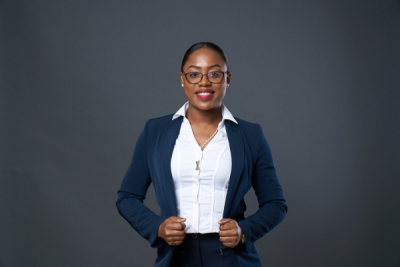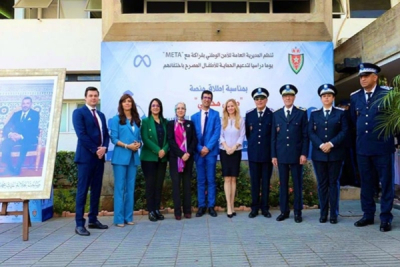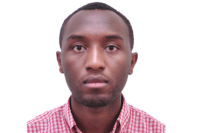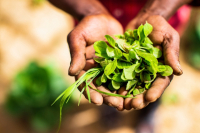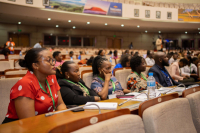He is a medical scientist specializing in radiology, biomedical chemistry, and molecular biophysics. He holds several patents and is among the leading scientists of the 21st century.
Samuel Achilefu (photo) is a Nigerian professor of radiology, biomedical engineering, biochemistry, and molecular biophysics. He is currently the Chair of the Department of Biomedical Engineering at the University of Texas Southwestern Medical Center.
He graduated from the University of Nancy, France, with a Ph.D. in Chemistry and Materials Science, in 1991. He also completed postdoctoral training in oxygen transport in biological systems and hematological science at the University of Oxford, UK. With his team, Dr. Samuel Achilefu invented cancer visualization goggles.
Before those goggles, it was difficult for surgeons to completely remove the cancerous tumor during surgeries. Thanks to the high-tech, infrared goggles, doctors can now distinguish malignant cells from normal ones during surgeries.
Surgeons told me that one of their problems is seeing beautiful static images of MRI and CT scans—but then when you go into the operating room you have truly nothing. It’s like walking in the dark,” Samuel Achilefu explained in late 2014.
His goggles have been used in more than 27 operations on patients with skin, liver, and breast cancers. Samuel Achilefu and his team explained that the cells must first be injected with an infrared fluorescent marker, allowing malignant cells to glow and get detected.
As an inventor, Samuel Achilefu already has over 65 U.S. patents. He is the author of more than 300 published scientific papers. His professional career began in 1993 at Mallinckrodt Medical where he was a senior researcher. In 2001, he joined Washington University School of Medicine in St. Louis as a professor and director of the optical radiology laboratory.
The inventor has received dozens of awards for his work in healthcare. In 2014, he received the St. Louis Award and the Medical Innovation Award. The following year, he won the St. Louis Innovator Award. The same year, he became the first recipient of the Distinguished Investigator Award from the Breast Cancer Research Program and received the Distinguished Investigator Award from the US Department of Defense.
In 2018, he received the Distinguished Investigator Award from the Academy for Radiology & Biomedical Imaging Research. The following year, he was also awarded the prestigious Britton Chance Biomedical Optics Award and, in 2021, he was elected to the National Academy of Medicine, one of the highest honors in health and medicine.
Melchior Koba
With digital transformation rapidly progressing on the continent, African countries are turning to space technology to accelerate the penetration of telecom services. Angola, which recently launched its second satellite, is already reaping the rewards of that choice.
In seven Angolan cities, hospitals, government offices, schools, and universities now have access to free Internet connectivity and the tools necessary for socio-economic growth, thanks to AngoSat-2, the country’s second satellite.
According to the National Space Program Management Office (GGPEN), the cities that benefit from the new satellite are Uíge, Cuando Cubango, Huíla, Luanda, Cabinda, Moxico, and Lunda-Sul.
The satellite launched on October 12, 2022, was commissioned in line with the national space strategy. Its goal is to help bridge the digital divide and exclusion in the country, in remote and underserved communities notably.
The AngoSat-2 satellite services are expected to cover the entire country, the African continent, and a large part of Southern Europe in the C-band. The satellite will also provide almost complete coverage of Southern Europe and Southern Africa in the Ku-band. It is expected to provide Angola with the means to reduce the digital divide, allowing Angolans equal access to information technology and communication (ICT) tools and opportunities.
AngoSat-2 was built by the Russian company Reshetnev Information Satellite Systems Company (ISS-Reshetnev) and put into orbit from the Baikonur Cosmodrome in Kazakhstan. The spacecraft comes as compensation for the $327.6 million AngoSat-1 satellite that was lost in space shortly after its launch in 2017.
Samira Njoya
Finding a property to buy or rent in large African cities is hard. In Nigeria, a tech entrepreneur wants to address some of the challenges faced by those who embark on that endeavor with his digital solution.
BuyLetLive is a digital solution developed by a Nigerian startup. It allows users, looking for apartments or houses, to find the property they are looking for by browsing classified ads listed on its platform.
According to Ola Daramola, the solution’s founder, BuyLetLive was launched to restore trust in the real estate market that has become complex and opaque.
“[...] We are well aware of the daunting process it takes to find a home. We experience severe opaqueness in the market and a lack of trust. Our solution at Buyletlive is very simple. We aim to ensure our users engage with verified agents and our agents get increased quality leads directly,” he said at a stakeholder engagement forum in 2022.
For the time being, the solution has no mobile applications. Users can browse the listed properties, create their accounts and carry out various actions only through its web platform.
Buyers and renters can use its search functions to customize their search based on various indicators including location, property types, price range, and the number of bedrooms. Agents can use the platform to find properties for their clients or list those available for rent or buying. The solution also allows developers to list their properties.
In 2022, the proptech startup was selected as the "Best Online Real Estate Portal Of The Year” at the Africa Housing Awards.
Adoni Conrad Quenum
She has over 10 years of experience in e-commerce, banking and finance, marketing, and branding in Africa, Asia, and the US. She founded a company that uses AI to help businesses effectively manage their inventory.
Marie-Reine Seshie (photo) is a Ghanaian economist who graduated from the Kwame Nkrumah University of Science and Technology in Kumasi, earning a bachelor of arts in economics. In 2019, she graduated from the Asia School of Business with a master's degree in management and business administration.
She is widely known as the CEO and co-founder of Kola Market, a startup that supports businesses in their sales and marketing activities by leveraging artificial intelligence.
Kola Market, founded in 2021, describes itself as a result-as-a-service company that offers innovative artificial intelligence-powered inventory management, marketing, and sales solutions. Its smart inventory forecasting and management system uses sales data from companies' stores, as well as other external indicators such as inflation, fuel prices, weather, etc., to generate perfect reorder levels daily, so companies can focus on selling and maximizing profits. On March 8, 2023, It was named on the list of the 15 startups that will take part in the inaugural class of Google for Startups Accelerator: Women Founders.
Its CEO is, since 2021, the social media marketing manager of ASB African & Caribbean Foundation, an association created by Asia School of Business students and alumni to uplift “the marginalized.” Her professional career began in 2012, at UBA Group where she was an accounts operations executive. In 2013, she joined First Atlantic Bank Ghana as a management trainee in the business development department. The following year, she continued her traineeship as an executive trainee in the business development and corporate finance departments. Then, in 2016, she was appointed assistant banking assistant.
In May 2019, she was hired by the e-commerce company, Jumia Group, as a project manager before being promoted to marketing manager the same year. In September 2020, she became the marketing manager of The/Studio, an e-commerce company based in California.
Ms. Marie-Reine is one of 22 finalists for the prestigious Aurora Tech Award 2023, which celebrates the female founders whose projects have greatly impacted global development.
Melchior Koba
In recent years, the federal government of Nigeria has multiplied collaborations with local startups. The aim is to harness the youth’s tech expertise for national development.
The Federal Government of Nigeria has approved the use of the humanoid robot "Omeife" to enhance digital literacy in the country. A memorandum of understanding was signed to this effect on Saturday, March 11, between the National Information Technology Development Agency (NITDA) and Uniccon, the company that developed Omeife, the first humanoid robot in Africa.
According to Yau Isa Garba, national director of the NITDA’s National Centre for Artificial Intelligence and Robotics, the “whole idea of the project is [...] to leverage Omeife to deepen digital literacy in Nigeria.”
“The plan is that we are going to use the robot- just like the way people use ChatGTP- for guidance, instructions, and so on,” he added.
Omeife was presented by Nigeria's vice president, Yemi Osinbajo, at the global innovation tradeshow Gitex, Dubai, in October 2022. The 1.80-meter-long female robot was manufactured with local components. It can speak Pidgin, Yoruba, English, French, Arabic, Kiswahili, Hausa, Igbo, and Afrikaans and understands different African cultures. According to Chucks Ekwueme, Uniccon’s CEO, Omeife is “not just multilingual, it can switch languages and interact with specific gestures—hand illustrations, smile, and other bodily gestures—that match the tone of the conversation.”
According to Barrister Emmanuel Edet who was representing the Director General of NITDA, Nigeria plans to develop an application that will allow everyone to take advantage of Omeife.
Meanwhile, according to Chuks Ekwueme, in a context where Nigeria targets 95% digital literacy by 2030, Omeife can lead the country and Africa in general into a digital future.
Samira Njoya
In Africa, despite authorities’ efforts, the number of missing children is not dropping the least. In that context, Morocco wants to capitalize on the decentralization of new technologies and ever-growing social media adoption to introduce a large-scale abduction alert system.
Morocco’s General Directorate of National Security (DGSN) officially launched "Tifli Moukhtafi" - translates to my child is missing- last Tuesday.
The system is a mechanism to alert and call for the search of children who went missing in suspicious circumstances. It was set up by the DGSN in partnership with Meta, the parent company of Facebook, Instagram, and WhatsApp. According to Ouafae Zouidi, head of international judicial cooperation and human rights at the presidency of the Public Prosecutor's Office, it leverages available databases and alert systems and capitalizes on the opportunities offered by artificial intelligence and tech tools in general.
In Africa, the issue of missing children is a tragic and often-neglected humanitarian problem, according to Patrick Youssef, regional director of the International Committee of the Red Cross (ICRC) for Africa. In August 2022, on the sidelines of International Day of the Disappeared, a report published by the ICRC warned that more than 25,000 minors are missing on the entire continent. This figure represents 40% of the 64,000 missing persons cases in Africa, according to the report.
By launching "Tifli Moukhtafi", the Moroccan government wants to put an end to the phenomenon of child abduction in the kingdom. The system includes a feature similar to the U.S. "Amber Alert" which will allow the real-time publication of disappearance cases on Facebook, starting from the users within the geographical area where the disappearance was reported, before being gradually shared in neighboring areas.
In Africa, local startups are facing strong competition from unicorns and other major companies. Nevertheless, despite their limited resources, they offer interesting solutions to the population.
Ahoko is a digital platform developed by an Ivorian startup. It allows individuals to rent cars, ranging from luxury vehicles to functional vehicles. It simply connects car owners looking to generate additional income with users looking for safe and reliable cars to rent at competitive prices.
To access its services, a user needs to set up an account on its web platform. But, without the account, he/she can still browse the available cars.
The platform boasts an interesting fleet. Whether it's for a wedding, an in-country working trip, or a visit, users can find the cars that suit them best. Using the search bar, they can search for the cars that match their budget and needs.
To rent a car without a driver on Ahoko, one needs to be over 25 years old at the beginning of the rental period, have an over-2-years-old driving license, or provide sufficient solvency guarantees of solvency/guarantor who will bear the costs in case of accidents.
In 2021, the start-up was one of the six Orange Fab winners. It thus benefited from technical and financial support from the Ivorian subsidiary of the Orange group. Currently, the startup operates in Abidjan and San Pedro but, it plans to expand to the rest of the country and eventually launch a sub-regional expansion.
Adoni Conrad Quenum
He strongly believes that with technologies such as artificial intelligence and machine learning, he can optimize the efficiency of healthcare services. This is why he joined forces with one of his colleagues to launch DoctorAI, a health tech startup that connects patients to healthcare professionals.
Kevin Muragijimana (photo) is a Rwandan physician who graduated from the University of Rwanda in 2019. He is the CEO and one of the co-founders of DoctorAI, a medical technology company that wants to modernize healthcare services in Africa.
The company, founded in 2019, uses artificial intelligence to detect breast cancer, chest, and heart diseases, and malaria parasites (among other conditions) from X-rays and blood-smearing tests with accuracies exceeding 90%. It plans to offer other services such as telescreening, telehealth education, telepharmacy, and telemedicine. Its app, which integrates all of its existing services, allows laymen to voice their health concerns, doctors to improve community wellness, pharmacists to easily dispense drugs, and researchers to impact the world.
“We are offering other services that will be available later, like online consultations with specialist doctors and licensed pharmacists. The market will also include telemedicine and telepharmacy. We plan to go global. We have made our distribution channels so smooth in a way that our software programs within the DoctorAI app are available to everyone with a smartphone, anywhere in the world,” Kevin told Disrupt Africa in March 2023.
Aside from being the CEO of DoctorAI, the latter is also the coordinating medical consultant of AFRI-ONC, a cancer information and research institution. He is also a doctor at the Rwandan Ministry of Health. Before founding his company, he interned at Centre Hospitalier Universitaire de Bicêtre in France in 2019.
Melchior Koba
To boost agricultural trade in Africa, in the current digital transformation age, changes are needed. In that context, the partnership aims to introduce the use of digital technologies to improve production.
Microsoft Africa Transformation Office (ATO) and OCP Africa recently announced a new collaboration to boost farmers’ skills and productivity. The partnership was announced during the 5th United Nations Conference on the Least Developed Countries (LDC5) held in Qatar.
The partnership aims to improve smallholder farmers’ skills and boost their access to information through agri-digital services by building on OCP Africa programs such as the agri-hub concept, which aims to support millions of farmers.
“Technology is the key factor to enabling and increasing access to finance, equipment, and sustainability for rural farmers, empowering local farmers in Africa. Our partnership with OCP Africa will help to directly impact smallholder farmers and improve production,” said Wael Elkabbany, Microsoft Africa Regional Cluster General Manager.
Despite rapid urbanization, agriculture-related activities still provide a livelihood for about 60 percent of the continent's working population and account for 15% of GDP. According to UN agencies' forecasts, farmland is expected to expand and productivity to increase through better use of technology and the implementation of smart and precision farming techniques.
Thus, by partnering together, Microsoft and OCP also aim to develop a digital agriculture platform to improve farmers’ productivity and operation management. The partnership also includes the adoption and integration of technologies such as cloud, artificial intelligence, agricultural data platforms, and Azure application modernization in the agricultural sector, leading to precision agriculture.
According to Mohamed Anouar Jamali, CEO of OCP Africa, the collaboration will, among other things, expand OCP's reach and have an even greater impact on food security across Africa.
Despite the Tanzanian government’s efforts, the country is still facing a huge digital gender gap. Nevertheless, the country is upping actions to remove barriers that prevent women and girls from accessing digital tools.
The Tanzanian government and the World Bank have reaffirmed their commitment to supporting women’s access to digital technologies.
On Tuesday, March 7, at a conference on women and technology held in Dar es Salaam ahead of International Women's Day, Nape Nnauye, the minister of information, communication, and technology, said the government and its partners are working to build a more inclusive and equitable future for women in technology in Tanzania.
The government has established a broad ICT program to involve women in the digital sector, we learn. According to Nape Nnauye, the Ministry of ICT plans to provide short and long-term training to 450 ICT professionals employed in the government, mainly women, starting in the 2023/2024 fiscal year.
Also, the government will soon unveil the National Digital Economy Strategy which is almost completed. The said strategy will lay out the country’s 10-year plan to develop its digital economy while closing the digital gender gap.
According to the Tanzanian ICT Commission, there are 1,011 registered male ICT professionals in the country against only 170 women. So, much remains to be done, according to Nathan Belete, the World Bank's country director for Malawi, Tanzania, Zambia, and Zimbabwe.
By funding Tanzania’s digital projects, the World Bank wants to raise the number of Tanzanian women engaged in the digital ecosystem.
Samira Njoya
More...
Moving goods to and from Europe has always been a challenging task for African merchants. A tech entrepreneur with ties to both sides of the Mediterranean decided to launch a solution to solve the problem.
Cloudfret is a digital solution developed by a Moroccan startup. It allows African merchants to quickly contact carriers to send or receive their goods from Europe.
The solution claims to be “the first digital platform that links the two shores of the Mediterranean by connecting shippers to an extensive and reliable network of carriers from Europe and Africa.”
Through its mobile (iOS and Android) app, users can set up their accounts and create freight orders in just a few clicks. They can also book trucks and track their goods in real time. In its bid to make life easier for both merchants and transporters, the solution sets up an environment where merchants can trust the transporters they are booking and are also ensured of getting the best rates. It also boosts transporters’ income by optimizing “empty truck returns” and ensuring them fast payments. Indeed, the solution uses an algorithm to identify empty carriers on their way back, therefore ensuring good deals for merchants while allowing carriers to monetize the empty returns.
In addition to road transport, it also offers sea transport on demand. To facilitate the process, it requires transport documents to be digitized.
According to PlayStore data, its Android app has been downloaded less than 100 times, which hints that the app is not yet quite popular. Nevertheless, in May 2022, the startup raised $1 million to support its growth in Africa and Europe. Also, in 2021, it was among the 16 finalists of the VC4A's Venture Showcase.
Adoni Conrad Quenum
With her all-woman company, she wants to inspire and guide more Senegalese women into digital professions. She is also planning several impact projects.
Ndeye Saly Dione (photo) is a Senegalese web and mobile developer. Concerned about women’s digital inclusion, she founded tech startup LingeeruTech in 2022, after graduating from the third cohort of Sonatel Academy, a free coding school.
LingeeruTech is a combination of a Wolof and an English word. It means “tech queens.” Truthful to its name, it works on strong impact projects, mostly with women, to identify daily challenges facing populations and address those challenges.
In an interview with We Are Tech, Ms. Ndeye explained that she launched LingeeruTech to get women involved in the ongoing digital transformation. "It all started with an observation I made [during my training] at Sonatel Academy. In my class, there were not many women. Even when I was a web and mobile development intern at water utility SEN'EAU, I was the only woman on the team. […] In my close circles, I didn’t have a female that could serve as a role model in the digital sector. By setting up that startup, I want to serve as that role model and show young women who are still studying or struggling with professional orientations that women can work in the digital industry,” she explained.
The young entrepreneur indicates that she plans to launch a training center where women and young girls who usually drop out of school early can be introduced to coding and digital tools. The aim, she says, is to give women the skills they need to work with dignity.
Currently, with her team, she is developing two key projects. The first is Fayy Fepp (pay everywhere in Wolof), a fintech solution that aims to help businesses and merchants easily accept mobile payments through QR Coding technology.
The second one is Samamënmën, which means “my skills” in Wolof. It aims to enhance the skills of every Senegalese to enable them to sell their skills and get hired based on those skills, not on the diplomas they have.
Melchior Koba
Cabo Verde’s 2030 national development strategy places digital transformation at the heart of development in every socio-economic sector. In the finance sector, digital tools are expected to boost competition and improve financial inclusion.
Cabo Verde will soon adopt a bill governing the establishment and operations of digital banks. Indeed, the country submitted a draft bill that will be reviewed by the parliament during its parliamentary session scheduled for March 8-10, 2023.
According to the preamble of the government bill, digital banking institutions will have to comply with the requirements prescribed in the money laundering and terrorism financing prevention acts and other applicable regulations.
The government believes that digital banks can be highly beneficial to the country’s economy. They can for instance boost competition, expand the product offering with advanced and specialized products and improve access to financing for SMEs. In that regard, the draft bill wants to regulate the activities, make the funding processes more efficient, and keep the interest rates charged for loans to various clients in check.
In Cabo Verde, seven banks operate with a general commercial license, employing nearly 1,300 workers. They recorded historic profits of 42.5 million euros in 2022, up 26.5 percent from the previous year, according to Central bank provisional data reported by Portuguese news agency Lusa in late February.
Samira Njoya
In Africa, the e-commerce sector is booming. Such solutions are multiplying by the day to offer increasingly interesting services and solutions to populations.
Copia is a business-to-customer (B2C) platform developed by a Kenyan start-up. It allows retail merchants and individuals to stock up on food, beauty, electronics, etc.
“Copia is designed specifically to serve this high growth but underserved consumer base who want access to high-quality products at the best prices,” explained Tracey Turner, one of the founders of the startup behind the solution.
Users can make purchases via the Android-only mobile app or on the web platform. They can create accounts on the platforms but, it is not a requirement to make purchases. “[…] You can shop without an account. You just provide us with your email and phone number at the time of ordering. You do need an account to view your Order History. This is to protect your privacy,” the platform states.
Copia also allows customers to have various products delivered to their families in remote areas. The platform serves several small towns and thanks to this service, residents in remote areas are not obliged to travel to big cities to get certain products. It created a USSD code that allows people with no access to the internet to order products on the platform. For the time being, it accepts only M-Pesa payments. It delivers the orders to relay points for free, allowing users to collect them. Nevertheless, it plans to launch home deliveries, which will be paid services.
Currently, the platform claims a network of over 40,000 digital agents, nearly 2 million customers, and over 13 million orders. According to Play Store statistics, its mobile app has already been downloaded over 100,000 times. The startup behind the platform was founded in 2013, in Kenya. In 2021, it launched in Uganda with plans to expand to other African countries. Since its creation, it has raised $100 million to accelerate its growth.
Adoni Conrad Quenumv





